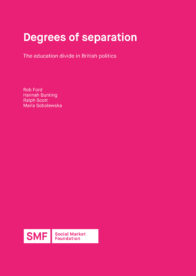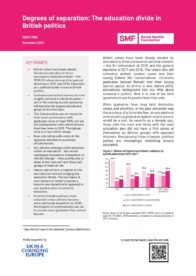British politics since the 2016 Brexit referendum has been characterised by the emergence of a new divide, between graduates and school leavers. Education now has a stronger relationship with vote choice than any other demographic or economic variables other than age. This report, from leading political scientist Professor Robert Ford, explores the implications of the changing electoral landscape for the UK’s major political parties.
SUMMARY
- The education divide has played a decisive role in recent votes in the UK. Education is one of the strongest predictors of Brexit preferences, with school leavers and graduates overwhelmingly backing Leave and Remain respectively. The Conservatives’ increased vote share in 2017 and 2019 was also driven by a near doubling of support among school leavers between 2015 and 2019.
- This is a new development – before 2016, school leavers were more likely to vote Labour in every election since 1979, while graduates have tended to vote Conservative.
- Education is the strongest predictor of voters’ social values – graduates tend to hold more liberal values while school leavers tend to have more authoritarian views. It also predicts social identities, as graduates are more likely to identify as middle class and European, whereas school leavers tend to identify as working class and with local and national identities.
- This poses serious electoral dilemmas for both the Conservatives and Labour, as many of the battleground seats between the two parties fall on opposite ends of the education divide. Any strategy that appeals to one of these groups is likely to alienate the other.
- Steeply rising graduate vote shares in ‘blue wall’ seats in the London commuter belt present new opportunities for the Liberal Democrats to build a geographically and demographically coherent heartland.
- But educational expansion is transforming the politics of the education divide across the country – by 2031, graduates will outnumber school leavers for the first time, as graduates are a far larger group among new voters turning 18 than those voters who pass away each year.
- This means that, while neither party could afford to alienate school leavers if it aspired to government before 2011, by 2031, a hostile graduate electorate will be fatal to electoral prospects.



